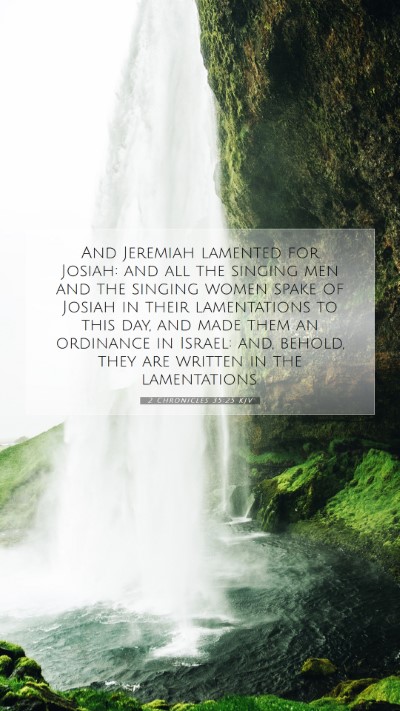Understanding 2 Chronicles 35:25
Verse Reference: 2 Chronicles 35:25 (KJV) - "And Jeremiah lamented for Josiah: and all the singing men and the singing women spake of Josiah in their lamentations to this day, and made them an ordinance in Israel: and, behold, they are written in the lamentations."
Meaning of the Verse
The verse describes the grief and remembrance following the death of King Josiah, a beloved ruler of Judah. His reign is marked by religious reform and a return to the worship of Yahweh, significantly impacting the nation of Israel. Jeremiah, the prophet, laments the loss of Josiah, emphasizing the deep sorrow felt by the nation's people. The lamentations made for Josiah became a permanent ordinance, demonstrating his lasting legacy.
Contextual Background
Josiah was known for restoring true worship and finding the Book of the Law, leading to a national revival. His untimely death in battle against Pharaoh Necho was seen as a tragic loss not just for Judah, but as a pivotal moment in Israel’s spiritual history.
Insights from Public Domain Commentaries
-
Matthew Henry:
Henry elaborates on the significant role that lamentation plays in the life of a community. The collective mourning points to a historical custom of honoring righteous leaders, reflecting a deep cultural aspect of communal grief and remembrance. This verse serves as a reminder of the importance of godly leadership and its lasting effect on the people.
-
Albert Barnes:
Barnes highlights the enduring nature of the lamentations for Josiah, noting that they were not merely spontaneous but were formalized into an ordinance, indicating the depth of feeling among the people. His commentary stresses the importance of safeguarding the memory of righteous kings and the void left by their absence.
-
Adam Clarke:
Clarke provides an analysis of the word "lamented," noting that it emphasizes the prophetic tradition of mourning and its significance. He reflects on the sorrow expressed through music and poetry as a means of cultural preservation, underscoring the importance of honoring past leaders in a way that shapes collective identity.
Modern Application
The application of 2 Chronicles 35:25 extends beyond historical context into contemporary life. It prompts us to reflect on how we honor those who lead us in faith and righteousness. The practice of lamenting can serve as a therapeutic process for communities to cope with loss and recognize the impact of leaders who have guided them on their spiritual journeys.
Key Themes
- Lamentation: The importance of mourning and expressing grief in a communal setting.
- Legacy: How a leader’s actions can have a long-lasting influence beyond their lifetime.
- Spiritual Leadership: The role of a righteous leader in guiding people toward faithfulness.
Bible Study Insights
When engaging in Bible study, 2 Chronicles 35:25 may lead to several insightful discussions:
- How do we honor the legacy of leaders within our own communities today?
- What does true spiritual leadership look like according to the Bible?
- How can we interpret the significance of lamentations in biblical traditions?
Cross References
To deepen the understanding of this verse, consider exploring the following related scriptures:
- 2 Kings 22-23 — Josiah's reforms and the discovery of the Law.
- Jeremiah 22:10-12 — Jeremiah's instructions for mourning and remembrance.
- 2 Chronicles 34:29-33 — Overview of Josiah's reign and the covenant renewal.
Conclusion
In summary, 2 Chronicles 35:25 serves as a poignant reminder of the impact a righteous leader can have on their community. The lamentations for Josiah not only reflect deep sorrow but also underscore the lasting nature of their memory and the importance of honoring spiritual leadership. This verse offers rich insights for Bible study groups, online Bible study, and personal scripture analysis, making it a valuable topic for exploration.
Through understanding this and similar verses, individuals can enhance their Bible verse understanding and find meaningful applications in their lives today, making it an important focus in Bible study lessons and discussions.


